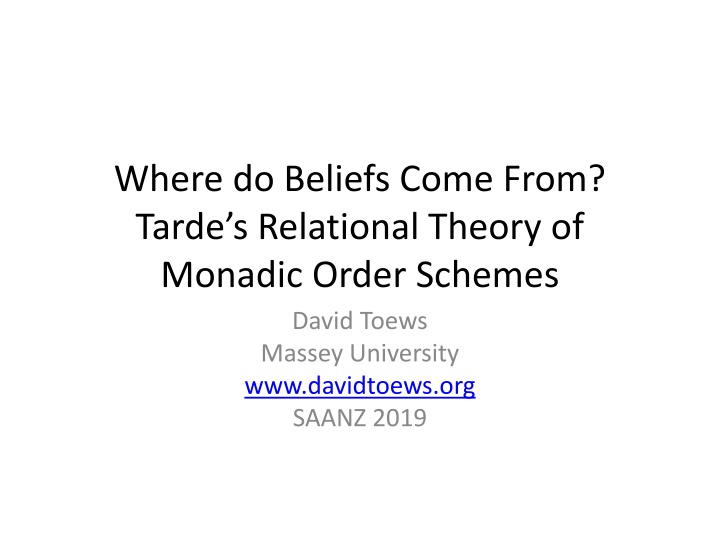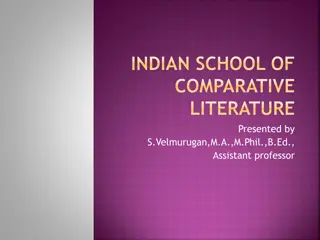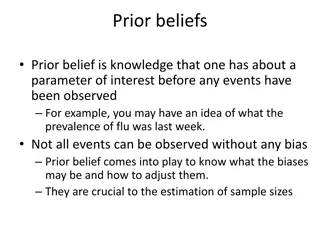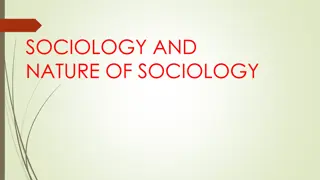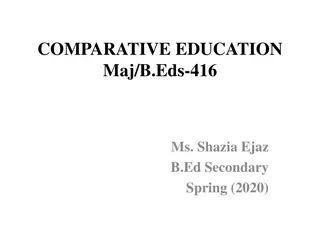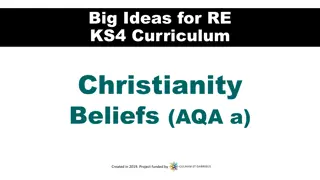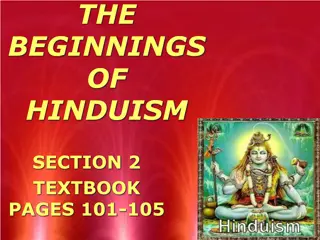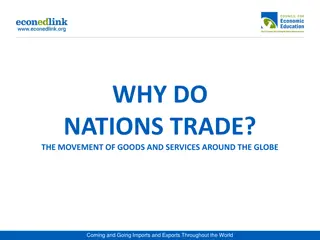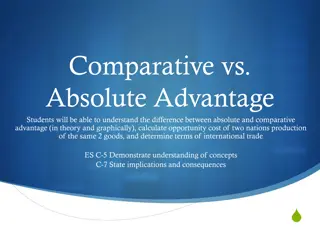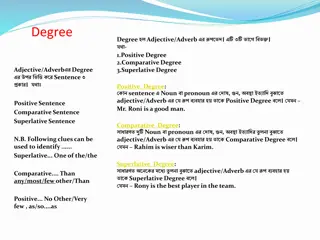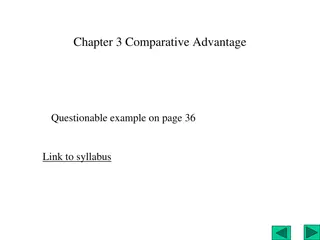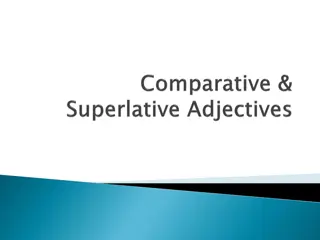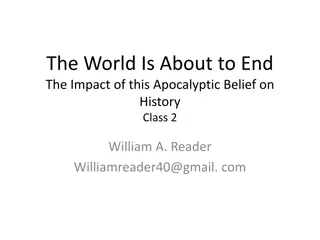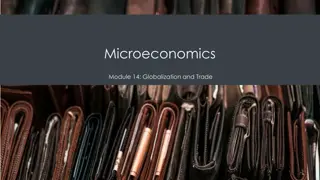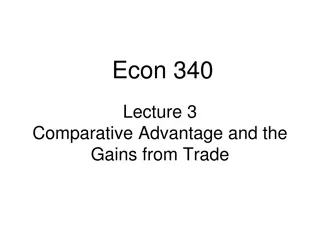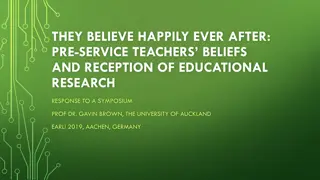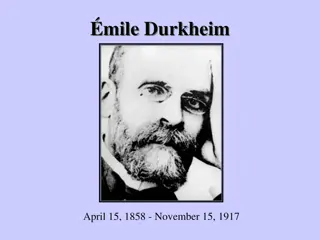The Origins of Beliefs: A Comparative Analysis of Tarde and Durkheim
Gabriel Tarde and Emile Durkheim engaged in philosophical debates on the origins of beliefs within societal structures. While Durkheim saw beliefs as integral to society's moral ideals, Tarde proposed a neo-monadological theory focusing on actors' beliefs within social practices. The discourse questions the coherence and reflectiveness of beliefs in constantly evolving social contexts, prompting a reevaluation of Durkheim's theories in light of contemporary complexities and non-human influences.
Download Presentation

Please find below an Image/Link to download the presentation.
The content on the website is provided AS IS for your information and personal use only. It may not be sold, licensed, or shared on other websites without obtaining consent from the author.If you encounter any issues during the download, it is possible that the publisher has removed the file from their server.
You are allowed to download the files provided on this website for personal or commercial use, subject to the condition that they are used lawfully. All files are the property of their respective owners.
The content on the website is provided AS IS for your information and personal use only. It may not be sold, licensed, or shared on other websites without obtaining consent from the author.
E N D
Presentation Transcript
Where do Beliefs Come From? Tarde s Relational Theory of Monadic Order Schemes David Toews Massey University www.davidtoews.org SAANZ 2019
Gabriel Tarde (1843-1904) engaged in debates with Emile Durkheim (1858-1917) over the nature of social life and the theory and methods of sociology (Matt Candea (ed.) The Social After Gabriel Tarde, 2010) Tarde offered a neo-monadological theory of the cosmos that he applied to sociology. Contra Durkheim, Tarde offers a theoretical framework that is neo-monadological and pragmatic. His sociology describes actors beliefs in relation to local and plural forms of order monadic order schemes -- within their situated social practices. This is my basic argument the key concept of monadic order schemes is my own conception. At the end of this power point are Appendices with supporting arguments and examples, and a bibliography, available at the following website: https://davidtoews.org/2019/11/28/saanz-2019-power-point-d-toews/ OR: https://tinyurl.com/tqamnlj
Durkheims conflation of belief and society Society is above all a composition of ideas, beliefs and sentiments of all sorts which realize themselves through individuals. Foremost of these ideas is the moral ideal which is its principal raison d tre. To love one s society is to love this ideal, and one loves it so that one would rather see society disappear as a material entity than renounce the ideal which it embodies. (Durkheim) The ideal is not simply something which is lacking and desired. It is not simply a future goal to which man aspires; it has its own reality and nature. It is to be thought of as looming impersonally above the individual wills that it moves. (Durkheim) Actors many varied beliefs are reduced to blind faith in the ideal of society as the medium of their actions.
So Durkheim, then, conceived private sentiments as subsumed under belief systems in relatively closed or established societies. Yet for his theory to work, we must assume that private beliefs are already more or less formed he has no account of those. Nor arguably in this globalized era of rapid change do we even live in a relatively closed or established society.
What if in actuality social situations are never whole and instead are constantly expanding and contracting in complexity, imbricated with all sorts of non-human assemblages (Latour, following Tarde)? In that context what are everyday simple beliefs? Where do they come from in the first place? And how can they be coherent and reflective of the collectivity? What theory or theories can improve upon Durkheim s?
Belief and Truth: Tarde s pragmatism versus Durkheim s sacredness Correspondence theories of truth tend to rule out any beliefs as having explanatory power, replacing them with falsifiable and constantly revisable statements. Both Tarde and Durkheim hold that the truth is always thicker than the thin theories of what corresponds with reality . Eg. the reality is that Trump was elected, but, is he really acting as a President? As we have seen, Durkheim holds that all beliefs are filtered through certain sacred beliefs which explain beliefs through the need for belonging. So if the US Presidency is a sacred institution, then people must only denounce Presidents as corrupt interlopers. They cannot denounce the Presidency itself without losing their own sense of reality as Americans. Anyone who studies the Presidency as an institution and claims that it is not what people think it is is just not American . Tarde is a pragmatist. Beliefs can be false if they have negligible effects or consequences. So if the Presidency is studied and arguments are made that it has not lived up to its ideology, and moreover if most actors now live in a globalized world that offers alternative routes to needed resources, the actors that still believe in the Presidency could be said to hold a false belief. Pragmatism recognizes beliefs as true when actors deem them necessary to believe, and the possibility of being excluded from a group is only one factor among many that actors must consider.
the social role of our beliefs Ethnomethodology (Garfinkel) Seeks to expand, thicken, and enrich our understanding of the contextual complexity of beliefs. Dissolves the theoretical status of specific beliefs, replacing them with a field of social relations in which reality resides. Neomonadology (Tarde) Seeks to understand the role of the simple within the complex. Beliefs (when pragmatically true) are irreducible and are a part of social reality Complexity is a network, a product of interaction In human affairs complex networks arise from our practices of imitating the looks, speech, texts, ideas, etc. of others. Beliefs are temporarily autonomous products of this imitative process. (eg. personal identity) Beliefs are not, as Weber held, mere states of ideal-typical psychology (eg. motives).
to summarize Durkheim and Tarde Durkheim s beliefs symbolic emblems of the social ideal absolute simples (simple formulas that cannot be countermanded without blowing up the whole society) Tarde s beliefs: network nodes facilitating social relations (for example: personal identity) relational simples (simple formulas that represent tendencies and directions of, or obstacles to change)
Why is Tardes sociology a neomonadology ? In Leibniz s original Monadology (1714) there are basic simple substances called monads. They are subject to an order pre-established by the principle of totality (God). Durkheim s sociology and Leibniz s monadology both assume that order can only make sense as coterminous with a totality (Society or God). In contrast, Tarde s neo-monadology reverses this equation, making order subject to monads. As I have argued in previous work, in neo-monadology monads are dynamic temporarily necessary schemes rather than unchanging substances. Order in the cosmos is shaped by the presence of monadic schemes. (Toews) In the universe, monadic order schemes vie for dominance over each other when interactions between people, animals, and other objects take place.
example: belief in climate change as a monadic order scheme Belief in climate change: is powerful because it is a simple truth that is gradually becoming for an increasing number of actors more real than competing beliefs comes not just from science but from actors in ordinary everyday life adopting premises from all sorts of observations of the world, beliefs and practices of others, their looks, notions, feelings, metaphors, memes etc. (delegation) is a compelling, true belief, also because such a belief is necessary to make an assemblage out of multiplying scientific theories (truth) is suggested by science and in turn influences science to be clearer and more evidence-based (reflexive) can be course-grained or fine-grained as it moves back and forth between simple moral ideals and crowd slogans (ie. in groups with strong ties) and more rational or debatable public opinion in media (ie. in networks with strength in weak ties see Granovetter) reflects an emergent, dynamic form of social order (corollary: membership in an established community which is Durkheim s criteria for beliefs cannot underwrite beliefs in climate change because a green society is still to be accomplished) locates power struggle in media presentations and further stimulates the development of media
Summary The sociology of belief does not consist in affirming moral ideals that enforce society s strictures at any cost (Durkheim) but rather requires analysing interactional networks of imitations knotted around monadic order schemes (bits of articulated knowledge) that vie with each other for dominance (Tarde). Belief in climate change is an example of public opinion that is a contingent product of networks of imitated ideas, sounds, looks, materials, practices, and observed facts of all kinds. It provides a relatively simple statement embedded within a complex social context. This enhances rather than reduces its status as true. Beliefs are generally not on the surface of discourse. The thick version of beliefs must be discovered through sociological analysis. Sociological analysis can also discover if beliefs are true or false. The truth or pragmatic exigence of a belief enables it to provide a point of resistance that contributes to the order and direction of that context.
Appendix: beliefs as monadic order schemes: Everyday experience (suggests methods): Theoretical concept: are simple ideas in the midst of complexity enable tentative order arise from everyday needs and desires that frame the discovery and communication of information are reflexively conditioned by and conditioning of scientific reason are produced and spread by imitation demonstrate how the public emerges as a form of selective imitation providing distance from the unselective imitation of crowds are networked via media technologies are reflexively conditioned by and conditioning of media are open ended, plural, and dynamically hierarchical demonstrate the struggle for domination of public opinion
Appendix: Monadic Order Schemes (Toews): Monadic order schemes are discoverable through analysis of the relations amidst complexities. Are simple units of order (relational simples). Complexity is a product of many monadic schemes interacting with one another. Interact with one another. No one monadic scheme explains a given situation or configuration. Monadic schemes rise and fall in importance or dominance relative to other monadic schemes. Are not essentially human, but rather condition and are conditioned by humans, animals, and objects of all kinds. Are real; they are not ideal types. Consequently there are many that we could never fathom. Account for the purpose of nodes in networks. Have a cosmic reality (cosmic = fluctuating open globality, ie. not totality).
Appendix A: Belief and public opinion Each of us has intensive quantities of beliefs that constantly rise and fall in magnitude, but we can only measure probabilities of our beliefs inasmuch as they are manifested in forms of public opinion. Public opinion is the product of some kind of mediation or educative intervention that helps people process various different forms of information (eg. biological, economic, political, social, aesthetic etc.). Example: If cholera is threatening a town, the inhabitants will be frightened when 10 cases break out, but if the next day there are 20 cases their alarm is likely to increase by more than double. The probability of cholera spreading (biological science) and the probability of it creating chaos in the town (social science) refer to different fields of statistics and require distinct forms of measurement. However, beliefs cannot be calculated in a manner that corresponds one-to-one with either the biological statistics about cholera or the social statistics about crowd behaviour. For Tarde this shows we are never given over to a complete and exclusive belief in something but rather we hedge our bets, because we are resistant to reducing our thoughts to only one way of thinking. Statistically this means that we believe that something exists, not directly in terms of the entity s actual quantity (since establishing this is one way of thinking), but rather in terms of whether it appears to have greater odds of existing than other things with lesser odds. In this way the scientific way of thinking is able to gradually hold sway without making us feel like we must believe every theory established by science. Communication is key. However imperfect the mathematical expressions of [social quantities] may be, it is above all because of the currents of belief and desire circulating among them that we can legitimately count men [and women], their actions, their works, and that we can claim for these enumerations the measurement of incontestable social realities. (Tarde 226)
Appendix: Ethnomethodology and its limitations A belief, understood interactionally, is an accomplishment of the individual actor in the setting of interaction. Beliefs are rather part of the accounting process, by which people offer accounts that make sense of their worlds (Garfinkel). Accounts that construct and maintain beliefs tend to drastically narrow down the possible explanations of behaviour, creatively editing out contradictory, potentially embarrassing, and/or extraneous elements. (Goffman) Note that the power of a belief as such is not just that it is unproven but is more in the way it is able to capture or project a simple image of reality amidst complex and potentially confusing interactions. Q: why do you go to Church? A: I believe in God. Ethnomethodology sees such accounts as over-simplifications and works to expand our awareness of the complex social order of social life. It tends to treat the simplicity of belief as an unwarranted and unhelpful reduction. But the fact is that the simplicity of a belief is a big part of what makes it effective, maintainable, and influential upon behaviour. Regardless of how widely shared they are, the most effective beliefs are always simples.
Appendix: Cosmic realism Cosmic reality = fluctuating open global networks of relations in which one finds assemblages that are only relatively and contingently bounded Disciplines are helpful but one must not confuse disciplinary boundaries with real boundaries. Sociology is not a new branch of knowledge, it is rather a growth in the main trunk. All science will be the science of associations in the future, which is essentially sociology. Human reality = networks of relations in nature (and really anywhere) that have been seized and ordered by humans through a process of imitating other people, animals, and things. Human innovation = unforeseen combinations of imitations
Appendix B : Imitation: public opinions versus crowds Public opinion has a consistency distinct from merely the quantities of various individuals beliefs as they are manifested in the mass or crowd of people. Using the example above, individual fears of cholera will vary from person to person depending on what factors each person in the crowd admits into their consideration. But a crowd is never just a crowd. There are always various elements in the crowd that are doing different things such as trying to join, escape, direct, or foment the crowd. Crowds provide energy and stimulus but they are chaotic. They provide opportunities for aspects of behaviour to imitate but such imitations are often ephemeral. Public opinion is a function of social order and produces more lasting networks of imitation (eg. in Tarde s time: newspaper audiences; today: social media). It arises when those who take a reasoned approach to the problem work to calm down the fears of those who are less experienced in reasoning. This will be successful if the people are disposed to imitate the behaviour of the leaders, eg. by being attracted to their leadership. The crowd still exists but it is rendered benign. It is through this conjuncture of reasoned communication and imitation that out of a chaotic crowd an orderly public opinion can be formed. Public opinion produces true beliefs , or beliefs that have more utility and universality than private beliefs.
Appendix: What is a true belief? What, then, is the status of a true belief , if any? Just as Plato demonstrated that understanding true justice requires understanding how it is dialectically related to social order, a true belief is one that, if taken away from the social interactions in which it is contextualized, would significantly change the latter.
Appendix: Durkheims problematic theory of the social whole Private sentiments do not become social except by combination under the action of the sui generis forces developed in association. (Durkheim, p. 10) This is agreed upon by interactionists as well as Durkheimians. But Durkheim sees this process ontologically as the making of the whole (10), as opposed to merely a process of the definition of situations. As we shall see, this stress on an ontological making of the whole was the point of departure for Gabriel Tarde s critique of Durkheim. Did Durkheim have an explanation for the making of the whole ? In the making of the whole in such a combination, with the mutual alterations involved, [ private sentiments , or beliefs] become something else. A chemical synthesis results which concentrates and unifies the synthesised elements and by that transforms them. Since this synthesis is the work of the whole, its sphere is the whole. (Durkheim p. 10-11) beliefs and society are fused together into one coterminous entity As a result of his metaphor of chemical synthesis, Durkheim was forced to hold the extreme and self-contradictory position that the social whole influences everyone but is found in no one. (11)
